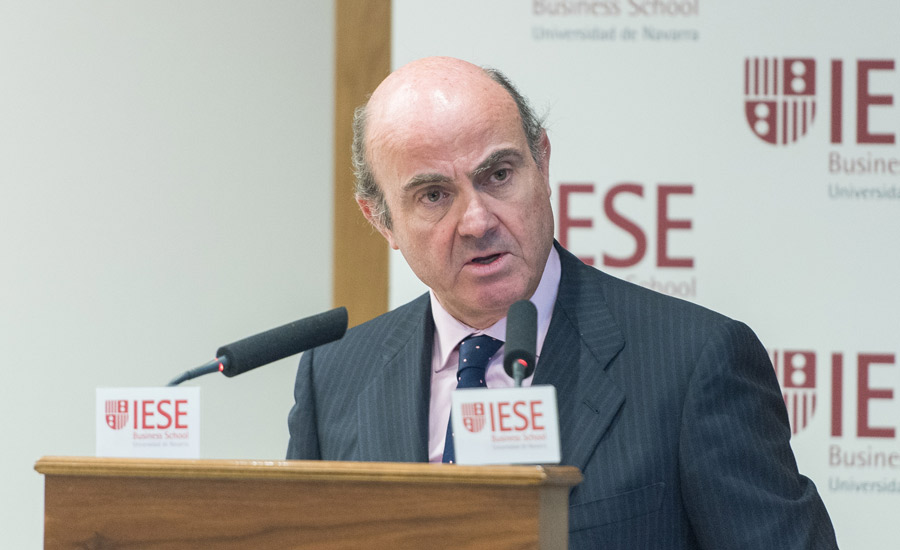
Massive loans by financial institutions, deficit accumulation and inadequate corporate governance. This dangerous combination nearly provoked the collapse of Spain’s economy – and caused the “longest, most painful and deepest crisis.”
So said Minister of Economy and Competitiveness, Luis de Guindos, at the 10th anniversary tribute of the death of Professor Rafael Termes (1918-2005). Termes was honorary president of IESE in Madrid and first president of the Spanish Banking Association (AEB).
“Economic recovery hinges on the banking sector appearing solvent,” said de Guindos. Now the brunt of the recession is almost over, Spain’s financial system is hardly recognizable as that of four years ago, he said.
“We can feel confident going forward because the sector has undergone profound restructuring. I hope that we have learned our lesson in the last few decades,” said the minister.
He also stressed the banking sector’s need to maintain its transparency, values, prudence, austerity and relationship with the real economy.
Thought and Action
Professors Antonio Argandoña and Juan José Toribio noted that the virtues listed by de Guindos also characterized Rafael Termes, a key player in the 1980s reform of the Spanish financial system.
Both paid homage to his work as a humanist and his staunch support of the market economy. In addition to his work at IESE and the AEB, Termes was also managing director of the Banco Popular Español from 1966 to 1977.
“He always stood out for the consistency of his faith, thought and action,” said Argandoña. He also highlighted two pillars Termes’ life and work: his defense of human dignity and his defense of freedom, which he understood as subject to truth and to the rights of others.
“Fortunately, the things that Termes taught us are still reflected in today’s society – and in life,” said Argandoña.
Professor Toribio considered the role Termes played in the reform of the Spanish banking system as president of the AEB, a post he held from 1977 to 1990. And his contribution to the reputation of the banking sector.
“He always said that a bank is a financial company. And that as a company, it should both generate wealth for the people that participate in it as well as provide a service to society,” he said.
“The Father of Spanish Finance”
Toribio attested that if Termes had been alive four years ago, the world’s economy would be different. He would have avoided the risky real estate and financial bubbles that took the world to the brink of financial collapse. “He’d have identified the problem quickly, and he wouldn’t have kept quiet,” said Toribio.
He emphasized that Termes advocated transparency as an essential value of banking culture.
“The example he set as an academic, a businessman and a servant of the state and society has continued to grow in importance over time,” said IESE Dean Jordi Canals.
Canals defined Termes as “the father of Spanish finance.” He concluded that “As one of our first professors of finance back in 1958, Termes introduced all of these concepts – adapting them to the European and Spanish context.”